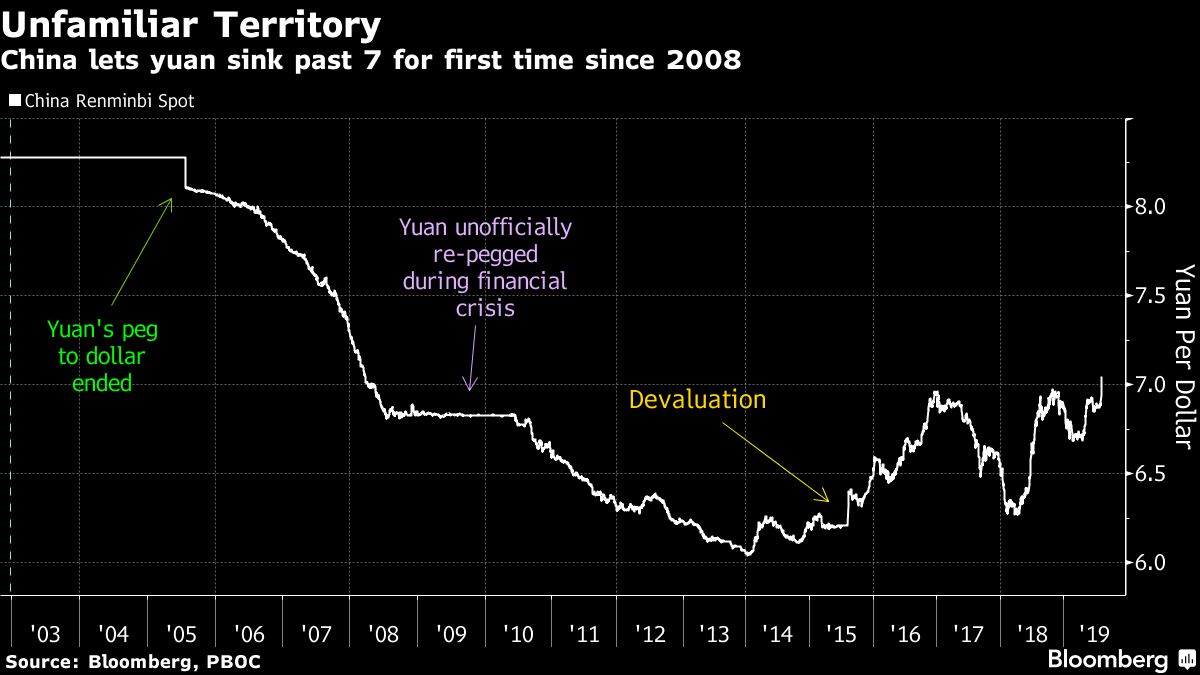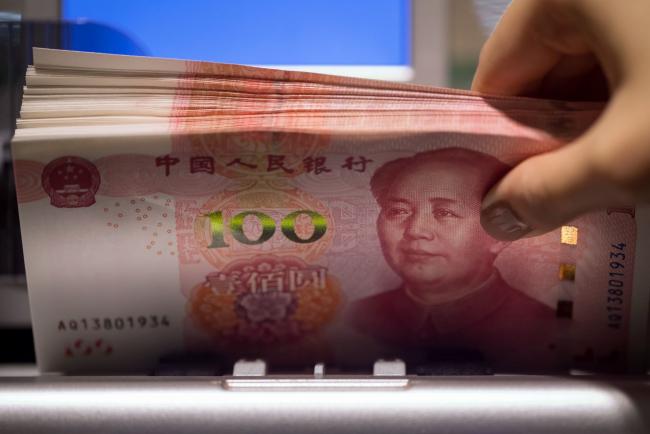(Bloomberg) -- The biggest slide in China’s yuan since 2015 threatens to revive concerns about the capital flight back then that helped spur the country to spend $1 trillion of its reserves.
For all its perceived success in tightening regulations and strengthening scrutiny of funds moving abroad, the trauma of that period poses a big reason to avoid any continuous depreciation. An even more-important financial consideration could be the stockpile of Chinese dollar debt, which has more than doubled since the end of 2015 to $729.8 billion, according to data compiled by Bloomberg. Issuance so far this year is a record $138 billion.
“Capital flight is still a major concern,” said Fraser Howie, who has two decades of experience in China’s financial markets and co-wrote the 2010 book “Red Capitalism.” “They are not going to be doing anything foolish.”
Indeed, even as the People’s Bank of China on Monday blamed the yuan’s tumble on the market reacting to the U.S. plan to impose fresh tariffs on Chinese imports, the central bank said it would fight against short-term speculation and stabilize market expectations. And the yuan could still return to trade stronger than 7 per dollar, it said in a statement.
That suggests limited appetite for the kinds of market-driven overshoots that regularly occur in other exchange rates. China is “playing with the margins” unless it lets the yuan sink to 7.5 per dollar, Howie said. It closed at 7.0430 in Shanghai Monday, reaching its weakest since 2008.
The slide in the currency was met with accusations of manipulation from U.S. President Donald Trump.
“China dropped the price of their currency to an almost a historic low,” he wrote on Twitter on Monday morning. “It’s called ‘currency manipulation.’ Are you listening Federal Reserve? This is a major violation which will greatly weaken China over time!”
PBOC Governor Yi Gang said China won’t use the yuan as a tool to deal with trade disputes.“I am fully confident that the yuan will remain a strong currency in spite of recent fluctuations amid external uncertainties,” Yi said in a statement published Monday evening in Beijing, adding that the bank will work to ensure “reasonable and legal demand” by companies and the public for foreign exchange.
Unlike Russia, which has aggressively sought to reduce its economy’s ties to the dollar, China remains strongly entwined with the U.S. currency. Any unrestrained yuan depreciation could make it tougher for Chinese companies to refinance, as well as incentivize firms and individuals to secret money outside the country.
Read about Russia’s pledge to ditch the dollar.
“We still expect the People’s Bank of China to tightly manage exchange-rate expectations and prevent the yuan from depreciating significantly,’’ Wang Tao, chief China economist at UBS Group AG in Hong Kong, wrote in a note Monday. “We do not think a significant depreciation would offset fully the trade war impact and, more importantly, the authorities also worry that a large depreciation could be destabilizing.”
China is already contending with a record series of defaults in its onshore bond market, the world’s second-biggest. A sinking yuan exchange rate could then force officials to organize financing for some offshore borrowers “and fold a few,” given industrial overcapacity, in the view of Sebastien Galy, senior macro strategist at Nordea Investment Funds SA.
Back in 2015 and years prior, Chinese found a variety of ways to squirrel money out of the country. Fake invoicing for overseas trade or services was one favored option. Regulators clamped down by stepping up scrutiny, and taking measures such as curbing purchases of overseas insurance products and stopping friends and family members from pooling their $50,000-a-year quotas to get large sums of money out.
Liu Li-Gang, chief China economist at Citigroup Inc (NYSE:C). in Hong Kong, is among those signaling confidence in the tighter regulatory oversight.
“The risk of a repeat of large capital outflow associated with the 2015-2016 depreciation episode could be contained,’’ Liu wrote in a note Monday. Even so, there will be leakage as “the uncontrollable errors and omissions type of capital flight will continue,” he wrote.
For now, officials may want to take a breather on yuan depreciation -- which China can affect through the fixings of the exchange rate in the onshore market, as well as controlling the cost of borrowing in offshore yuan and ultimately outright intervention -- in the view of Jason Daw, head of emerging market strategy at Societe Generale (PA:SOGN) SA in Singapore.
“They may want to see the impact on capital flows before permitting another leg higher” in the dollar-yuan rate, Daw wrote Monday. Still, he sees a rising tail risk of a slide to 7.50 to 7.70 per dollar.

